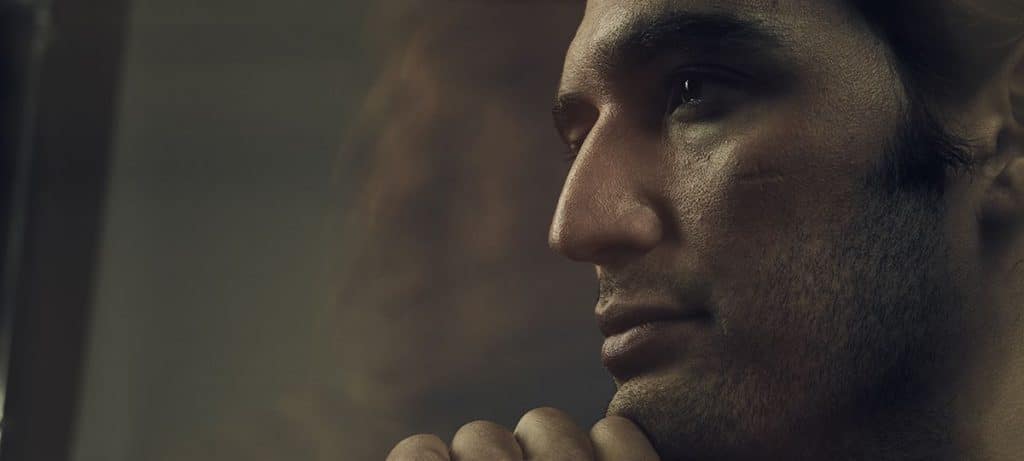
Fans of Brain Games and the YouTube series Shots of Awe will be glad to see that host Jason Silva has a new project — the NatGeo series Origins: The Journey of Humankind (Mondays at 9/8c).
We sat down with the self-described “wonder junkie” to talk about what his new show’s about, why it’s important, and why we need it — and other science-themed programming — now more than ever.
Monsters & Critics: What was the origin of Origins: The Journey of Humankind?
Jason Silva: It’s the story of how we got to where we are. It’s the story of human life from a modern lens tracing back our origins.
Really, we’re looking at all the next big things at moments that made humanity humanity.
So, we have an episode all about fire; what fire is. We have this natural physiological relationship with fire from when we first domesticated fire and it started acting as an external stomach.
It pre-digested our food. Every meal became more energy efficient so we could stay for longer without cooking.
We wouldn’t have developed culture or arts or language if we were just foraging, eating anything that we find.
We basically had to forage all day and eat all day and it was only when we started cooking that all of a sudden there was time for leisure and culture.
So think of that as a metaphor for all the artifacts, all the inventions, all the technology, all the cultural innovations that emerged from the human mind that we designed, so to speak, and that designed us right back.
M&C: So we’ve been physically designed by early changes in how we once lived?
JS: With the advent of stone tools after many generations my jaw is physically shrinking. Yeah, there’s a physiological effect of artifacts in our technology.
Like the philosopher Marshall McLuhan said, they would build the tools and the tools build us.
So, back to the episode on fire. We used to carry fire, and without it logically all of human culture wouldn’t happen.
So then we have an episode on transportation and then we have an episode on money. Money is a complete cultural, symbolic construct.
It’s a consensus hallucination, a consensus trance without which we would not be able to exchange values.
But nonetheless, imagine the imagination we needed to allow the world to become what it is.
Imagination is a capacity to imagine things together, to share hallucinations that allow us to bring those things in a super group.
But at the same time without it we wouldn’t be able to collaborate and work toward things that are beyond our lifespan, things that don’t neatly feed us or shelter us, to work for things for our legacy or for humanity.
The neocortex is thinking about the future, and that allows for us to exceed basic needs and to move beyond physical needs to take care of those basic things and then be concerned with higher goals.

M&C: Is Brain Games on hold?
JS: There’s been no official announcement whether it’s on or is coming back.
But, you know, as of now it’s just like we’re doing brain art. We’re doing very well. And then we’ll see…
M&C: What else are you doing now?
JS: I do an insane amount of public speaking to technology companies, mostly IBM, Intel, Microsoft, Oracle and Cisco, to inspire audiences and to talk about the future of technology. I do a lot of them about innovation and creativity disruption.
So it’s real for me, because I think that the success of Brain Games has positioned me as sort of the popularizer of science and tech, and my digital following online is associated with celebrating big ideas.
Because I’m very much in demand I’m on the road all the time, so I’m not shooting as much.
Though I like to think I get inspiration for, especially my digital ideas, everywhere.
M&C: Is Origins your way of bringing Shots of Awe to the TV-watching public?
JS: It’s short-form, frenetic, visual, mind-brain explosion stretching into an hour-long show.
The concept here was, well, Jason will do his thing, and then we’ll have these cinematic re-tellings and they will come back to you and do your thing, and then it’s done. So I’m interested to see how the format plays out.
I think the idea of a feature-length documentary can be exciting. So that’s definitely something that I can take a dive into.
M&C: This is an expensive-looking show. It really has a feature-film feel to it.
JS: There is this corporate reinvention, and they’ve really decided to commit to premium adventure science and exploration.
I think that’s because in the age of YouTube, you better go premium if you want to retain eyeballs.
You’ve got to be offering something that nobody else can offer. And so it’s really exciting, and for me it’s great because I’ve always been an ideas guy.
M&C: Is there a need for more science-based TV?
JS: I think now it’s more important than ever to make sure we keep pushing, raging against the darkness.
But the great thing about this show is that it doesn’t seem like it’s giving a lecture.
M&C: Is having a science-based show now more important than it used to be?
JS: Absolutely. I mean, we have to be offering alternatives to the prevailing anti-science narratives that we’re seeing more or more.
I think that people like the press are players, you know, so why not make celebrities out of thinkers?
Turning thinkers into celebrities, I think, is awesome. I just think more of getting people like Ron Howard and Chris Nolan with their films and ideas out there, and that what they bring is important. You know, Carl Sagan is one of my heroes.
M&C: And you’re following in his footsteps.
JS: I’m trying, you know, I’m trying.
Origins: The Journey of Humankind airs Mondays at 9/8c on National Geographic.